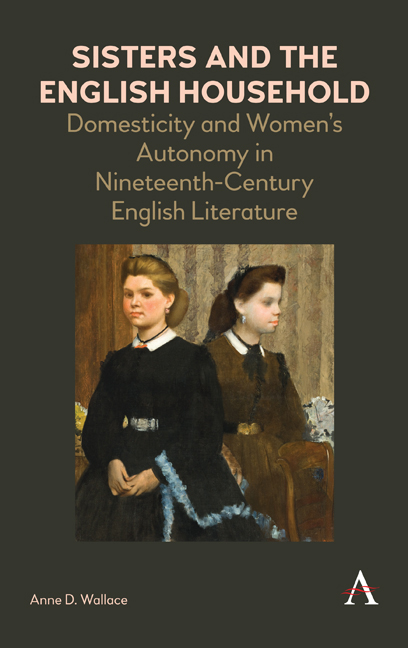 Sisters and the English Household
Sisters and the English Household Book contents
- Frontmatter
- Dedication
- Contents
- Acknowledgments
- Introduction
- 1 Alternative Domesticities: Revaluing the Sibling in the House
- 2 “Out into the Orchard”: The Departure of the Sibling in the House
- 3 The Problem of the Sister in the House
- 4 George Eliot's Natural History of the English Family
- Notes
- Works Cited
- Index
3 - The Problem of the Sister in the House
Published online by Cambridge University Press: 29 May 2019
- Frontmatter
- Dedication
- Contents
- Acknowledgments
- Introduction
- 1 Alternative Domesticities: Revaluing the Sibling in the House
- 2 “Out into the Orchard”: The Departure of the Sibling in the House
- 3 The Problem of the Sister in the House
- 4 George Eliot's Natural History of the English Family
- Notes
- Works Cited
- Index
Summary
At the end of Austen's Mansfield Park, Sir Thomas Bertram finds that his personal happiness and his family's fortunes are embodied in a most unexpected person: the poor niece he fostered from her childhood, Fanny Price, who will marry his second son, Edmund, and so secure the family's future. With both of his blood daughters compromised, one by scandal and divorce, the other by a less than salubrious marriage, and his elder son weakened by a gambling habit and physical illness, Sir Thomas learns that “Fanny was indeed the daughter that he wanted”:
His liberality had a rich repayment, and the general goodness of his intentions by her deserved it. He might have made her childhood happier; but it had been an error of judgment only which had given him the appearance of harshness, and deprived him of her early love; and now, on really knowing each other, their mutual attachment became very strong. After settling her at Thornton Lacy [Edmund's living] with every kind attention to her comfort, the object of almost every day was to see her there, or to get her away from it. (546)
Fanny's domestic services to the family as constant companion to Lady Bertram and general household assistant will now be supplied by Fanny's sister Susan, who becomes “the stationary niece” and in a short time “could never be spared” by their aunt (546). With three Price nieces and nephews provided for (though William's commission can only indirectly be attributed to Sir Thomas), and one of them married to his second son, Sir Thomas finds happiness in “[Susan's] usefulness, in Fanny's excellence, in William's continued good conduct, and rising fame, and in the general well- doing and success of the other members of the family, all assisting to advance each other, and doing credit to his countenance and aid” (547).
We recognize here the outlines of a corporate household partially restored: despite the elder Ward sisters’ initial hostility and later inattention to their poorer sister, sibling ties reestablish themselves through the uncle- bymarriage's provision of material and, eventually, emotional care to his niece.
- Type
- Chapter
- Information
- Sisters and the English HouseholdDomesticity and Women's Autonomy in Nineteenth-Century English Literature, pp. 85 - 126Publisher: Anthem PressPrint publication year: 2018


